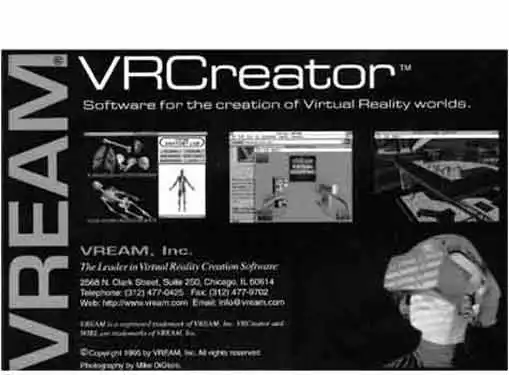Small Business Startup News
Facebook's Acquisition Of Oculus Fuels Interest In Virtual Reality Startups, Irks Kickstarter Backers
Written by Tim Morral
Published: 3/31/2014
Facebook's recent $2B acquisition of Oculus VR is drawing attention to other virtual reality startups, while the company's Kickstarter backers feel shortchanged.
I was the co-founder of a virtual reality software company that sold out to a public company in 1996. The acquisition price, $10.5 million, was a number that made shareholders very happy.

1995 advertisement for my startup's VR software
As I think back to the virtual reality headset manufacturers at the time, and how they struggled, I'm still in shock regarding the news that Facebook is paying $2 billion for a virtual reality company.
Two billion dollars is a lot of money. But for Facebook's Mark Zuckerberg, it's just another day at the office. Following up on its $19 billion purchase of WhatsApp, Facebook recently shelled out another $2 billion for Oculus VR--maker of the virtual reality headset known as Oculus Rift.
Oculus' primary market is the gaming community. Using Oculus Rift, users are able to enjoy an immersive gaming experience, with the headset functioning as a monitor that has limited controller features. The acquisition of Oculus supports Facebook founder Zuckerberg's belief that after mobile, virtual reality will provide the next big leap in technology.
"Mobile is the platform of today, and now we're also getting ready for the platforms of tomorrow," said Zuckerberg. "Oculus has the chance to create the most social platform ever, and change the way we work, play and communicate."
And apparently, Facebook isn't the only player expressing interest in virtual reality startups. According to the Venture Capital Post, the Oculus acquisition is highlighting the value of other VR startups, like Virtuix Omni.
"My inbox has been flooded by investors who want to touch base," Virtuix Omni Founder Jan Goetgeluk told Bloomberg News. "A big player like Facebook entering the space is a great validation on how virtual reality will be a mass-market medium, reaching mass-market audience."
But not everyone is happy about the attention virtual reality startups are receiving from investors and VCs. During its initial startup phase, Oculus was funded by 9,500 backers through a Kickstarter campaign. Instead of using the Kickstarter money to bring a line of products to market (as most of the Kickstarter funders had hoped), Oculus parlayed the funds into three rounds of VC funding and ultimately, an acquisition by Facebook.
It's important to note that there is nothing illegal about Oculus' business strategy. But as a result of the actions of Oculus and other startups, many Kickstarter backers are beginning to question the funding model. In many cases, crowdfunders are primarily interested in seeing a product brought to market and are now unsure whether or not the companies they support actually share their goals.
Although the future of crowdfunding is unclear, if companies that raised money with crowdfunding continue to disappoint their funders, it could have a trickle down effect throughout the entire startup community--and severely impact the ability of small, innovative startups to raise capital through nontraditional funding vehicles.
It seems more likely that Kickstarter will continue to play that role for many companies but will have a dual role as a buzz generator for other startups. The reality is that many companies are using Kickstarter as a marketing tool. They could easily raise funds through other means, but completing a Kickstarter round is a PR win that can generate significant buzz.
With respect to VR's second life, it's great to see it. Netscape, Microsoft, Platinum Technology, Silicon Graphics and other high-flying tech companies bought VR companies in the nineties, with the expectation back then that it was the "next big thing." That turned out to be false hope.
With the current tech bubble, lots of technology "paisley ties" will get a rebirth.
VR companies operating today might be a beneficiary of tech geeks with billions of dollars willing their tech fantasies to come true, regardless of market demand.
But you never know. For me, as a former VR entrepreneur, VR's being embraced by the masses has always been a "when," not an "if."
Maybe this really is the time that VR will go mainstream.
Share this article
About Our Small Business News
Our reporters publish news articles for entrepreneurs five days a week. Our small business news articles review trends in business management, analyze the ramifications of regulatory initiatives, present relevant entrepreneurial research findings, and cover many other topics of interest to entrepreneurs.
Additional Resources for Entrepreneurs
